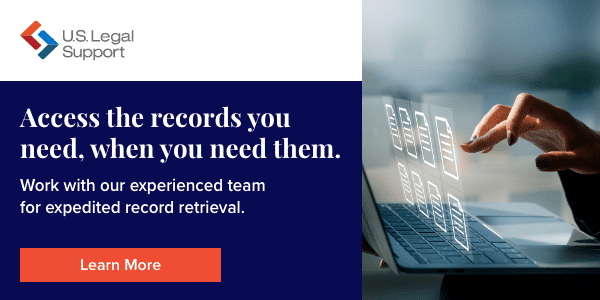Industry Outlook:
The Past, Present and
Future of Record Retrieval

In litigation, the act of retrieving records – medical, employment and wage, education, financial and other supporting documents – is a critical, daily discovery activity. Extreme care, attention to detail and relentless follow up are necessary to help keep discovery on track. While the use of records in litigation has remained constant, the technology, service offerings and retrieval process have evolved in recent years. What can the legal industry expect in the future for record retrieval? We sat down with Jim Cunningham, U.S. Legal Support Senior Vice President & Division President, Record Retrieval Operations, to discuss the past, present and future of record retrieval and to explore how U.S. Legal Support is evolving its service offerings in our ever-changing environment.
Jim, you’ve been in the litigation support industry for over 25 years, specifically focusing on retrieval of records in relation to your clients’ discovery efforts. How has the process of record retrieval changed over the last decade plus?
In the last decade, the biggest change has been the transition from a paper-intense process to a paperless environment. It used to be that record retrieval providers had to copy and ship paper records. Now, most of the process is digital. This has been an extremely positive change. As a provider, we’re able to expedite the retrieval process for our clients, thus keeping discovery on track. We have also digitized the delivery of records for our clients. Within the U.S. Legal Support Client Portal, our clients can order records, check record status in realtime and download retrieved records all in one secure area.
What have been the most impactful technological advancements in the industry?
There are two areas in which technology has significantly enhanced the record retrieval process – online client portals and record delivery capabilities. First, the ability for clients to order, access and download records online is a huge time saver. At U.S. Legal Support, we are constantly enhancing functionality of our Client Portal to provide clients with streamlined, self-service capabilities. Clients can not only order records, but they can also receive realtime status updates of an open record order as well as download and save retrieved records directly from our repository. Second, the way we deliver records has vastly improved with technology over the years. We OCR all records so the document is word searchable, organize and group documents by record type per client instruction and we can even put an entire case together in chronological order.
What are some of the biggest challenges that law firms and insurance companies face when it comes to retrieving records?
The biggest challenge our law firm and insurance clients face hasn’t really changed through the years – the challenge remains to receive records quickly and accurately in a cost-effective manner. What sets U.S. Legal Support apart from other providers is our dedicated, elite record retrieval team. Our team retrieves more than 27,000,000 pages of records each year. That works out to about one record every twenty seconds, every single business day. In strategically placed hubs across the country, our team works together with our clients to ensure that they’re not only getting accurate records in a timely fashion, but also at a cost-effective rate.
How has U.S. Legal Support leveraged its relationships with facilities to best meet its clients’ needs?
Our nationwide footprint has allowed us to establish and leverage our relationships with more than 1.1 million facilities across the country. With over 400,000 record requests coming in on an annual basis, the facilities know U.S. Legal Support and we treat them like our clients – with respect, care and personal attention.
In recent years, we have enhanced our processes for communication with facilities. Prior to these recent changes, one call or email to a facility would be regarding one order for a case. Using technology to our advantage, we can now call on multiple requests at one location, advancing the process and getting records to our clients sooner.
Security is paramount to law firms and insurance carriers. With a plethora of confidential and sensitive case and client data housed within records, what steps should a firm take to protect their data?
It is critical that law firms work with a reputable partner that is HIPAA compliant and SOC 2 Type II certified. Importantly, they need to ensure their partner has attestation from a reputable independent auditor to ensure all systems, processes and controls actually ensure HIPAA compliance and follow SOC 2 Type II guidelines. Additionally, it’s important to work with a partner who has intrusion detection and prevention systems, conducts third-party penetration testing, offers frequent backups and replications across geographically dispersed datacenters and who has a disaster recovery plan in place.
How has the global COVID-19 pandemic impacted record retrieval?
Just like all industries, the pandemic has certainly impacted the record retrieval process and legal industry at large. With thousands of healthcare facilities across the nation closed due to state mandates coupled with delayed postal service, we’ve had to take additional steps to ensure timely retrieval of records. And, of course, hospitals and doctors’ offices have naturally shifted their focus to beating COVID-19, which has slowed down the retrieval process. At U.S. Legal Support, we have been fortunate that our nationwide footprint has allowed us to move workflows from closed facilities to open facilities to process and fulfill orders for our clients in a timely manner.
What new offerings/services/relief has U.S. Legal Support brought to clients in light of the challenges with COVID-19?
In response to the pandemic, U.S. Legal Support has developed a couple of new service offerings that will not only help in the short term, but also in the long run. We’ve developed a new online MedRec Portal which allows facilities to upload records directly, securely and electronically into our Client Portal, avoiding the costly and timely activities associated with printing and shipping records. This has allowed us to provide an even quicker turn-around time for our clients, even among facility closures.
Secondly, we have built a new X-ray image processing system. Previously, facilities had to burn X-ray images onto a CD and ship them to our offices for processing. Now, they can send X-rays to us electronically through our secure upload system. We then transfer these images to our Client Portal, allowing clients to download them from their device quickly and easily.
What do you see as the next big technological (or other) advancement in record retrieval?
The biggest change I see on the horizon is the way in which records are delivered. The use of Artificial Intelligence (AI) is beginning to become more widespread in the legal industry. From contract review and negotiation to predictive analytics and legal research, AI has many applications in the legal industry. For record retrieval, AI will allow us to deliver records by case, in chronological order, while providing summaries of records.
Out of all the record retrieval service providers, why should someone choose U.S. Legal Support?
U.S. Legal Support has a national presence with over 85 physical offices and robust digital infrastructure and state-of-the-art security including SOC 2 Type II certification and HIPAA compliance. Our strategically placed record retrieval hubs allow us to retrieve upwards of 400,000 requests annually. We are also a one stop shop for all litigation support needs. We offer court reporting services including complete remote depositions, interpreting and translations, trial services and transcription services. No matter your needs, we are here to help.
To learn more about our record retrieval capabilities or other litigation support services, explore our services here. To place a records order, visit our Client Portal or email [email protected].
Editoral Policy
Content published on the U.S. Legal Support blog is reviewed by professionals in the legal and litigation support services field to help ensure accurate information.


